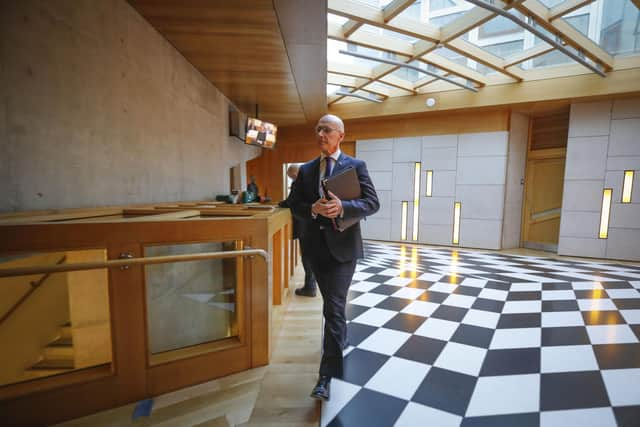£1.3bn 'excluded' from SNP/Green budget hides scale of cuts for public services - IFS
This article contains affiliate links. We may earn a small commission on items purchased through this article, but that does not affect our editorial judgement.
Announcing his budget yesterday, the deputy first minister and interim finance secretary said around £1bn had been found for the health service, with an additional £550m for local government.
However, his claims on overall public spending on services has been undermined by the IFS who said public service spending will drop by 1.6 per cent next compared to this year in real terms once inflation is taken into account.
Advertisement
Hide AdAdvertisement
Hide AdThis is in comparison to the budget which suggests the increase will be an average of 1.9 per cent across devolved services.
Bee Boileau, a research economist at the IFS, said Mr Swinney and the government had understated the scale of the cuts to public services by failing to include increased funding handed to portfolios during the current financial year. Instead, the government has used figures from what was originally budgeted to be spent this year, rather than the correct, updated figures.
This effectively excludes £1.3bn in spending in the 2022/23 financial year from the calculations of how much the budget for 2023/24 has increased.
She said this has the most obvious impact for councils. Instead of seeing a decrease of just 0.2 per cent in real terms as suggested by the Scottish Government, much lower than the 2.4 per cent cut outlined in the resource spending review in May, councils will instead be hit by a 5.0 per cent real terms cut, if not more.
This would have significant implications for the financial health of local government which has been straining following years of under investment and council tax freezes.


One solution could be for councils to raise council tax in line with inflation, potentially increasing bills by 10 per cent in April. Senior council figures were criticising the budget last night, with a council leaders meeting of COSLA, the representative body for local authorities, meeting this morning.
Ms Boileau said: “More funding from the UK government and a better showing from Scotland’s devolved taxes means that funding for most services next year has been topped up compared to plans set out in the Scottish Spending Review in May.
“The Scottish Budget suggests that funding for health and social care will now grow by 2.9 per cent in real terms between 2022–23 and 2023–24, compared to the 0.2 per cent real-terms growth planned in May, that the budget for justice, policing and veterans will grow by 2.5 per cent in real terms, compared to the 2.4 per cent cut set out in May, and that cuts to local government budgets will be only 0.2 per cent, compared to the 2.4 per cent cut previously planned.
Advertisement
Hide AdAdvertisement
Hide Ad“But these figures overstate the funding increase from this year to next for many services. That is because the Scottish Budget compares plans for next year with what was originally budgeted to be spent this year, and in many cases budgets for this year have since been topped up. Local government is a notable case in point, where a sizeable £540 million extra has been found for pay awards this year: the costs of these awards will continue into next year, but this funding has been excluded from the year-to-year comparisons quoted by the Scottish Government. Taking this into account suggests that rather than falling by 0.2 per cent in real terms, as suggested by the Scottish Budget, funding for local government will actually fall by 5.0 per cent, and perhaps more.
“In all, around £1.3 billion of in-year top-ups to funding this year have been excluded from the figures. This means that rather than increasing by an average of 1.9 per cent, as reported in the Budget, Scottish Fiscal Commission figures imply real-terms spending on devolved public services will be 1.6 per cent lower next year compared to this year.”
The Scottish Government has been contacted for comment.
Want to hear more from The Scotsman's politics team? Check out the latest episode of our political podcast, The Steamie.
It's available wherever you get your podcasts, including Apple Podcasts and Spotify.
Comments
Want to join the conversation? Please or to comment on this article.
